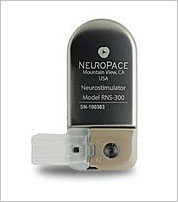So, imagine you are three years old. You started walking at 10 months, you have a great vocabulary for your age and you are just a little clumsy, just like Daddy. In other words, you're a rather normal little boy, going to pre-school, learning to be self-aware and independent. Then, one night when you are 3 1/2, you wake and your arm is asleep. So, you get out of bed and go tell mommy and daddy who are still watching TV. But your arm isn't just tingly, it can't move. It's paralyzed. "That's OK," mommy and daddy say, "it's just really asleep. Let's go back to bed." A month later, no one really notices when you seem a little sleepier, or a little clumsier in the mornings. After all, you are only 3 1/2. Then, one morning, something happens and then you notice that mommy and daddy are asking if you are OK. They've just watched your right arm start shaking, while your eyes were open but blank. It lasted only about 30 seconds, and you don't remember a thing, but mommy and daddy look concerned and schedule a doctor's appointment. The doctor makes you jump up and down, move your arms in funny ways, do some high fives, touch your nose. He says you are probably OK, but if it happens again, mommy and daddy should call.
It happens again. Almost three years later, you are now in Kindergarten, and it's still happening.Jack is my son, and he has a seizure disorder. Most people know it as Epilepsy. The doctors think it is a particularly kind of Epilepsy characterized by continuous or persistent abnormal electrical activity during "slow wave" sleep. ESES - Electrical Status Epilepticus Sleep. It's the same as, or slightly different than (Doctors disagree), CSWS - Continuous Spike Waves During Slow Wave Sleep. Jack may also have Landau Kleffner Syndrome. ESES/CSWS is a component of LKS. LKS is typically characterized by a loss of the ability to express or understand spoken language - or both. Some people with LKS, ESES, CSWS don't have visible seizures. Jack has had them all. And it is clear that his ability to express himself verbally has been effective, though not severely. The Doctor hopes that Jack's left-handedness is evidence that maybe his speech is controlled on his right brain.
Since May 2004, Jack has had each of the following kinds of seizures - appearing approximately in this order.
Complex Partial Seizures (with Todd's Paralysis)
Absence Seizures
Simple Partial Seizures
Simple Partial with secondary generalization
Myoclonic
Cluster absence seizures
Head droop seizures
Atonic Seizures (Drop Attacks)
Complex Partial again
Simple Partial again
Absence again
Droop again
Myoclonic
Tonic-Clonic (First ever full body seizure was this morning)
Since May 2004, Jack has been on the following medications. Usually, when the meds are changed, we see 4-8 weeks without seizures, then they return and we increase or change the medication and get another reprieve (except one mediciation that made things worse). Anyway, here goes.
Trileptal
Trileptal/Lamictal
Lamictal
Lamictal/Depakote
Lamictal/Depakote/Keppra
Lamictal/Depakote/Klonopin
(4 uses of diastat (valium) - 2 in last week).
So, there are the basics. How is a Kindergartener supposed to learn to write when his right hand is weak and almost useless and he left is unsteady and shaky?
Want to know how a 6 year old with no fine motor skills in his right hand (can't even hold a small object) plays XBox. He uses just his left hand, controlling one joystick with his palm and tapping the buttons at the same time.
Want to know how to tell if seizures are returning before you actually start seeing them? He loses interest in playing XBox.
Right now the Doctors don't know what to do. We have increased the Lamictal again and hope to see results so we can all have a fun and seizure-free Christmas. Otherwise, we'll return to the Epilepsy Unit at Wake Forest to be left, once again, with no clear idea of what to do.
Finally, I grew up knowing nothing about epilepsy, other than jokes about "get the spoon!" (bad idea, by the way). It's amazing that so many people are living with this, yet apparently, Epilepsy just doesn't have the high profile of much less common afflictions - mostly because Epilepsy takes so many forms and is often not debilitating. But sometimes, it is.
Now, imagine you are 6 years old. You're having breakfast when both arms start seizing and your whole body goes rigid. Mommy lays you down on the hardwood floor because, well, the kitchen has hard wood floors and a rigid 6 year old is hard to carry to the carpet or couch. Now imagine the big seizure ends but you start having a lot of little ones and mommy takes you to the couch. She calls daddy and puts him on speaker phone while mommy goes upstairs to get the diastat to give you a rectal dose of valium. And you know that's what's coming. Your shoulder starts twitching, eyes are dilating. And undilating. And dilating again. The seizures aren't stopping. And daddy asks you "Jack, how are you feeling?" You struggle to get the word from your brain to your mouth. Then you answer, as you always do, "Great!" Because you don't remember when seizures weren't a part of your life. And you are "Great!"


